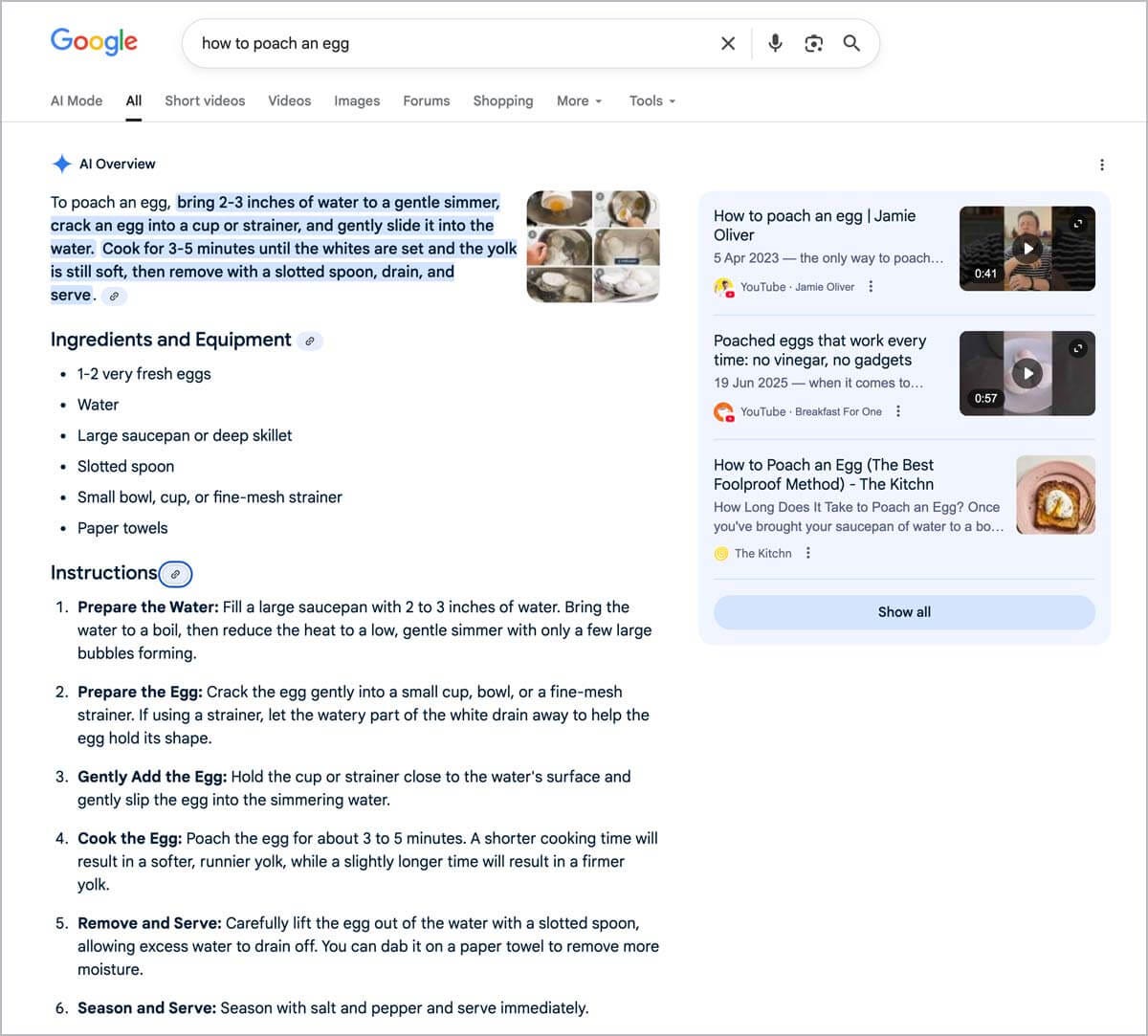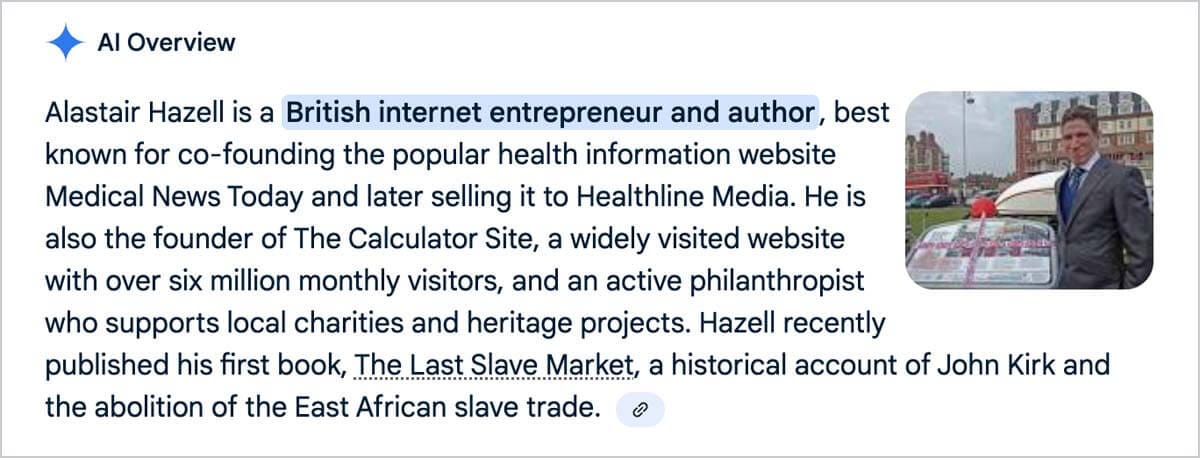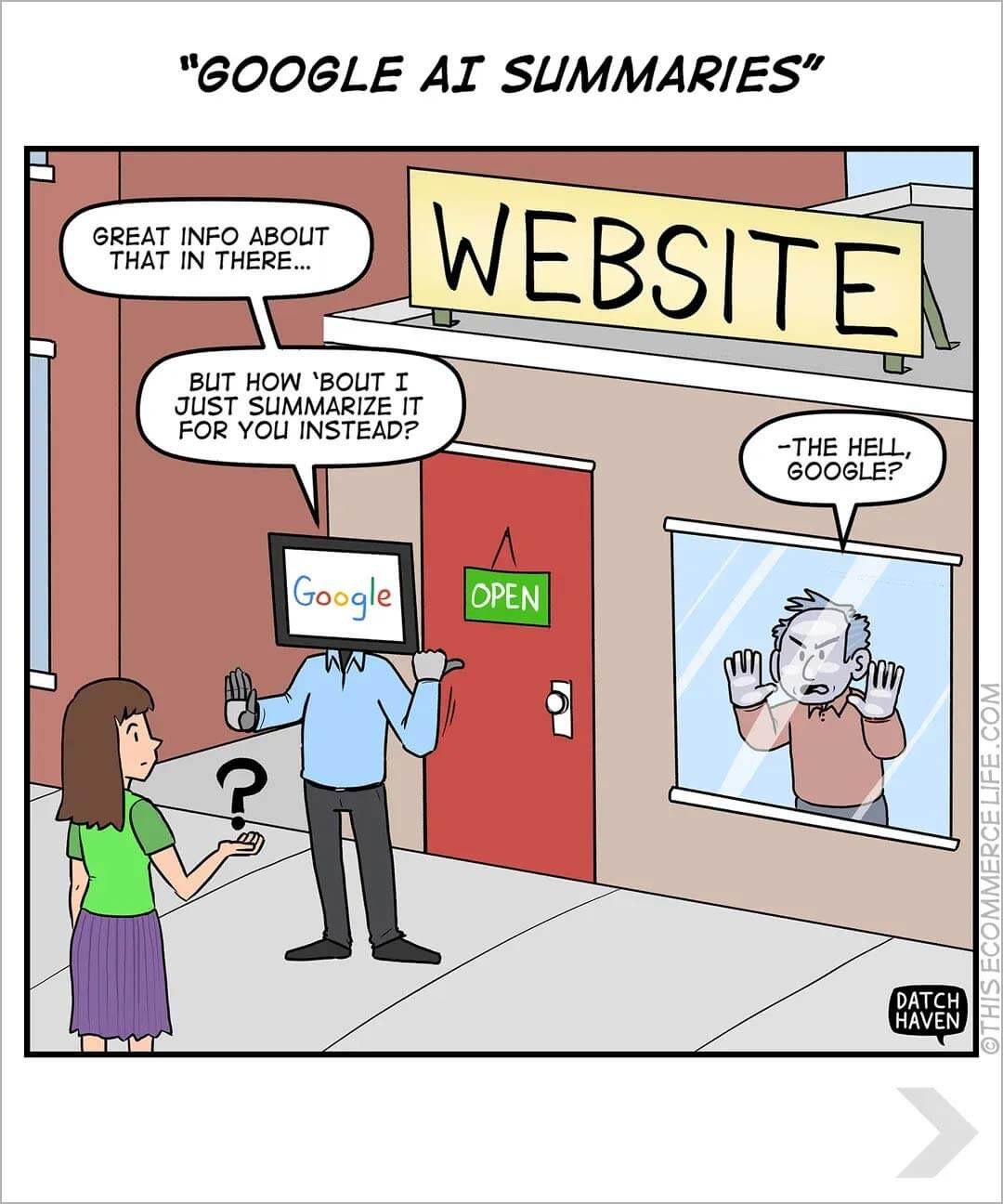Are AI Overviews Killing the Open Web?
What Google's search changes mean for the future of independent publishing.
For over two decades, Google Search has been the dominant referrer of website traffic for online publishers – a vital connector between people and their content. But now, that traffic is in steep decline as Google aggressively rolls out AI Overviews into its search engine. Independent publishers are in trouble, and without intervention, many won’t survive.
Let’s start by heading back to the beginning.
The early days
My web publishing journey began in 1996 after I left college and first picked up an HTML coding book. The internet was very new and cool at that time, and I enjoyed playing around with layouts, colours, fonts and graphical elements. It engaged the creative side of my brain.
Fast forward a couple of years, and I found myself working as a web designer for an internet service provider. The era of free dial-up access had just begun, and more people than ever were going online.
This was a time when Internet Explorer was a frustrating foe, and no website seemed complete without flashing animated GIFs.
(Come on, cat, catch that insect!)
It was in 1998 that Google launched its search engine, and I remember that time well. Here was this upstart company challenging established players like AltaVista, Hotbot, Excite, and Yahoo! The bright, playful colours of their logo and website felt revolutionary and fresh, and their ‘I’m feeling lucky’ button seemed cool.
Little did I realise at the time how enormous and powerful Google would become and what an influence it would have on my future businesses.
The Google dependency trap
For the last twenty years, web publishers have relied on Google for website traffic. Google has dominated the search market, meaning that for publishers like me, every algorithm update has felt like a game of roulette.
Survive an update unscathed and – big sigh of relief – you live to fight another day. Get hit by a penalty or demoted in the rankings, and you face potentially devastating traffic losses.
For people running online businesses, livelihoods and jobs have continually depended on the decisions and algorithms of a single powerful company.
Since the turn of the century, Google has dominated online search with over 90% market share. Only recently, with the emergence of AI chatbots, has this figure dipped below 90%. And this dip was a crucial one because it woke Google up to the threat that AI chatbots such as ChatGPT pose to their core search business. Their response? AI Overviews.
Publishers have, of course, become accustomed to competing with Google’s own products and features in search results over the years. Features such as Sponsored links (ads), Google Shopping, Featured Snippets, Knowledge Panels, ‘People Also Ask’ boxes, YouTube videos and Google’s own conversion tools – all pushing organic search results further down the page.
But here’s the important thing. Google’s AI Overviews now pose a significantly greater threat because of the way in which they provide comprehensive responses to users’ searches.
What are AI Overviews?
AI Overviews are blocks of text that provide direct answers and summaries to a user’s search. If you search for ‘how to poach an egg’, you’ll receive an AI-generated summary containing specific instructions for how to boil the water, crack the egg and cook it. Google includes links to the sources it has used for the information, but most users never need to click them because the answer is already there.
For users, it’s incredibly convenient. For publishers, however, it’s devastating. They spend time and money writing, creating and hosting their original content and receive nothing in return for its use.
As with all the best things in life, it helps to explain this situation with a cake analogy…
Imagine you own a cake shop and you spend all morning baking delicious cakes – lemon drizzle, chocolate and the classic Victoria sponge (your Granny’s recipe). One morning, someone comes into your shop, takes your cakes (without paying) and stands on the street outside giving away slices for free. They put up a small sign pointing people inside for more cake, but most people have had their appetite satisfied by their free slice and walk away. Only about 1 in 100 cake eaters come into your shop.
This comparison holds true – and the issue is more widespread than you might think. Allow me to demonstrate with the AI Overview that appears for my own name. I’m not doing this as an ego trip, by the way, but to highlight two issues:
AI Overviews now appear for countless searches. I’m hardly a household name (to say the least), yet Google still deems an AI Overview necessary for my search result, rather than just including a standard search listing for my website.
The information is prone to inaccuracies. This is something Google itself acknowledges. The text about me contains several mistakes. The biggest being that there’s more than one Alastair Hazell, and I’m not the author who spent time in Africa and published a book about the East African Slave Trade. In fact, I would argue that I’m the least interesting Alastair Hazell (go meet the other one, he sounds cool!).
Although I’m highlighting a single case here, numerous documented issues have been reported in recent months with AI Overviews giving false or misleading responses. One of the most famous is the suggestion to add glue to pizza to make the cheese stick. Mmm. Delicious.
This raises concerns that people might rely on these summaries as fact without verifying the original sources. It also risks something called circular reporting, where AI-generated misinformation gets cited by other sources and becomes falsely legitimised.
Making matters worse for publishers, it’s been reported that AI Overviews may be favouring certain larger platforms. Independent research suggests that content from Reddit, Quora, and YouTube (Google’s own video platform) gets cited in AI answers more frequently than independent blogs and publisher websites.
This creates a double blow for independent publishers - not only do AI Overviews reduce their traffic, but they may be less likely to be selected as sources in the first place.
The scale of the problem
So how big is the problem? Well, data from Advanced Web Ranking suggests AI Overviews now appear in more than 50% of all search results. We mentioned earlier that Google includes links to sources within the AI Overviews. However, a study from Pew Research Center suggests that as few as 1% of users click them.
The impact on traffic can be severe. Research by analytics firm Authoritas reveals that websites previously holding a top search ranking can experience traffic drops of up to 79% when their results appear beneath an AI Overview. And this makes absolute sense to me – why would anyone scroll below the AI Overview if it gives them all the information they need?
I do need to point out that Google disputes these findings, with a spokesperson calling the analysis “inaccurate and based on flawed assumptions.”
Google’s mixed signals
I must say that I find it challenging to properly gauge what Google thinks about AI Overviews and the Open Web because they seem to be sending out contradictory messages. For example, Nick Fox, Google’s senior vice president of knowledge, recently claimed on a podcast that “From our point of view, the web is thriving.”
Yet in a September 2025 court document, Google made a contrasting statement:
“The fact is that today, the open web is already in rapid decline and Plaintiffs’ divestiture proposal would only accelerate that decline, harming publishers who currently rely on open-web display advertising revenue.”
As The Verge noted, this may be a tactical move to appear weaker and less monopolistic in court. However, as someone who has worked in the online publishing world for over 25 years, I believe their statement on the Open Web is actually quite accurate.
As far as AI Overviews are concerned, Google’s stance appears to be that they are beneficial for publishers. Liz Reid, Head of Google Search, recently insisted:
“Overall, total organic click volume from Google Search to websites has been relatively stable year-over-year... we’re actually sending slightly more quality clicks to websites than a year ago... This data contrasts with third-party reports that inaccurately suggest dramatic declines in aggregate traffic — often based on flawed methodologies, isolated examples, or traffic changes that occurred prior to the roll out of AI features in Search.”
Where does the AI Overview data come from?
As we touched on earlier with our cake shop analogy, Google must obtain the information for its AI Overviews from somewhere. And it gets it from publishers themselves. Effectively, Google’s systems crawl and index publishers’ content, which is then processed to generate AI Overview responses to search queries. It then includes small links through to publisher sources.
It’s something that’s summed up brilliantly in this humorous cartoon by Datch Haven at this ecommerce life.
In September, Penske Media, the owner of Rolling Stone, Billboard, and Variety, became the first major U.S. publisher to sue Google over the use of its content in AI-generated overviews. Penske Media says that revenue from affiliate sales has declined by more than one-third.
This could be the first of many lawsuits filed against Google. And I think the outcome could have significant repercussions for the independent web ecosystem. If things remain as they are, I believe we will see widespread layoffs in the online publishing industry as traffic and revenue decline, and costs have to be cut. This will inevitably lead to a reduction in both quality and output.
We also need to spare a thought for smaller publishers – single-person websites or those with only a handful of employees. What once made the internet such a special place – the independent websites and blogs – is being slowly destroyed. Many will pivot to generate traffic from social media, and some will succeed. But a lot of sites that rely on Google for their traffic and advertising revenue are suffering right now. The future for them looks tough unless significant changes occur.
Of course, I should point out that this isn’t solely a Google problem. Other search engines, such as Bing, have introduced similar AI summaries, while ChatGPT and other AI chatbots continue to gain users. Google may be thinking that removing AI Overviews would lead people to migrate to these competitors. AI Overviews are, after all, very convenient for users. But that convenience comes at a cost – and it’s publishers who are paying it.
The future
Given this competitive reality and user convenience, it seems likely that AI Overviews are here to stay. The question then becomes: how do we ensure fair compensation for publishers whose content powers them?
There are signs that publishers are starting to organise. The non-profit RSL Collective has developed open standards that enable machine-readable licensing terms for content, attracting the attention of major publishers including Yahoo!, Reddit, Medium and Quora. The idea behind RSL is that publishers can collectively negotiate compensation when AI systems crawl and use their work. This creates a framework for sustainable royalty streams rather than one-off deals. Like Apple Music for web publishing.
Some alternatives within the search sector are already implementing this kind of model. Kagi, the paid, privacy-focused search engine, has introduced proportional source attribution in its AI answers. Each source used for a response receives a percentage that indicates its contribution, and Kagi says it plans to utilise this technology to automatically share profits with publishers (with no contracts or deals required). Whilst Kagi’s market share is currently tiny compared to Google’s, it demonstrates that fairer models are technically possible.
As yet, Google, which dominates search, has shown no signs of adopting this kind of approach.
I believe the current situation is unsustainable: Publishers cannot provide content that powers AI services whilst receiving nothing back – especially when Google now runs ads within AI Overviews, generating revenue from their work.
The Penske Media lawsuit, and any others that follow, may prove pivotal in establishing legal precedents for content compensation. If successful, Google may be forced to completely rethink how its AI Overviews operate and how it compensates publishers for using their content. The RSL framework appears to be the ideal solution.
In summary
If we remain on this current course, we’re heading towards a dramatically diminished online publishing landscape, where publishers are left to fight over a shrinking pool of traffic.
There’s a real threat that much of the independent voices, journalism, niche expertise, and diverse perspectives that made the internet extraordinary will disappear or be marginalised. And what remains may be a corporate-controlled information landscape where only the largest publishers with significant influence and social media followings survive.
The clock is ticking.
The question isn’t whether the Open Web will change - it’s whether independent publishers will exist to be part of what comes next.
Alastair
If you enjoyed this article, please consider giving it a like and sharing it with anyone you think might enjoy it.
You can also subscribe for free below if you’d like my next article to sneak politely into your inbox.












